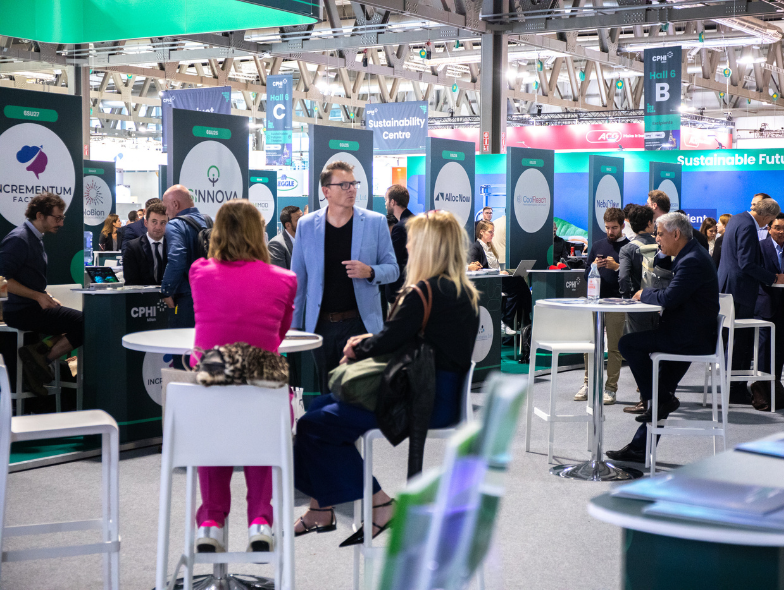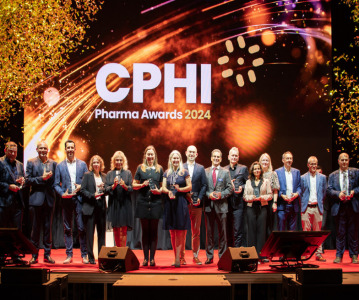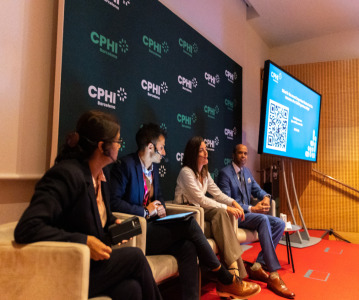A Day in the Life of a Procurement Specialist
.png)
To get to know the people working day to day behind our pharma companies, the ones who keep the wheels turning and ultimately bring better healthcare to the population, we are talking to the individuals at the heart of pharma.
In this month's interview for the series, Margarita Gomez, External Supply Procurement Head (Small molecule & Biologics) at Sandoz, tells us about her career, the value of diversity in her work, and importantly how to manage her and her team's wellbeing on a day-to-day basis.
Margarita Gomez
I'm originally from Colombia and I did an undergrad in finance and international relations and off the back of that I studied in Canada and in Austria, and when I finished my degree I went to the UK to work in financial services.
I went on to do a Masters in International Business in Manchester and I started working in corporate taxes at Deloitte, which I did for about a year.
(Right: Margarita and her children)

Then I was talking to some of my friends from the Masters and some of them had gone into procurement graduate schemes, and I really liked the combination of having to look after legal topics, commercial topics, understanding macroeconomic dynamics that influence what you buy.
And there’s an international side to procurement. So I thought I'll get into this area and I've never looked back! I joined Mars on the procurement graduate scheme, first buying indirect in areas of Spain and within the UK, and then I moved to direct where I have been ever since.
For direct, I started buying commodities for Mars. So dairy effectively, and it was really exciting seeing and being able to touch everything you buy. So you go to farms, you see, how your product makes it to the consumer in the end and Mars is a really good procurement school. They train you really well, because they allow people to work in different functions, and to support those career moves they have very good internal training. So I did that for about two years and then I was approached by GSK and I joined pharma and that was over 15 years ago. Within GSK, what I found was a great ground to grow professionally.
I started buying raw materials for the consumer business, then I moved to pharma, buying some of the materials and then packaging, and I was able to drive some important change programmes that deliver really good value for the business. And off the back of that I got a promotion to director. I worked as a primary packaging director and it was the first time I had a global team and very experienced colleagues.
Typically they locally source material, but what I did in that role was to achieve some global coordination and really step up the relationship with the suppliers that we were working across the different geographies by being able to outline what was happening around the different countries we were interchanging with them and then after that success in primary packaging, I got promoted to the leadership team of procurement in manufacturing at GSK, and I was the head of strategy compliance risk.
Then I was going to go back to commercial part. So I moved to a role in McKesson Walmart. They have a joint venture side in generics. I did that for two years and I got closer to the patient in that role because it was buying finished products for the pharmacies in the US; after doing that for two years, I was approached by Novartis.
Now I work in the generics business on the small molecule side and I did a year as the head of directs because we were building the organisation from scratch but now I'm focused on finished dosage forms for sourcing for large molecule and small molecules.
This is an important spend, a multibillion dollar spend, so it’s a big responsibility, but I have a really great team behind me and a great company where I have been able to grow and learn and continue to do so, not only about procurement but about the business and how you can drive impact from procurement for the organisation.
Could you please describe a typical day in your role?
I typically start by looking at my diary and checking that I don't have too many conflicts because we clearly have multiple things for the same time, so I have to prioritise.
I print my priorities for the year and I stick them in front of me so that I don't lose sight of what's most important and most impactful for the business and then I try to prioritise my activities by any major developments that the business needs me to attend to.
I start day with Asia, typically Japan, China, because of the time zones we have to have the conversation early in the morning for me. I will typically have a financial review on a monthly basis with them or specific supplier conversations or molecule conversations early in the morning. Then I will move to India. I normally have an important team and an important footprint of suppliers, so there are a lot of discussions there and I'm currently supporting the separation of the two companies and my separation lead is based in India, so we spend quite a lot of time looking at these big transactions that need a lot of attention and work from our team and global coordination.
Then we get to mid-afternoon and there is either functional meetings, either procurement, to focus conversations with some of my peers in other categories or my CPO and or I have engagements, governance meetings with my stakeholder base, which is the external supply organisation, and these meetings tend to be at around midday because you have global teams and they all have to dial in at that time. So you can catch all the time zones and then later in the afternoon I catch the Americas time zone. Brazil, Canada, the US, and it's a lot about how do we generate value and it’s important to touch base with the team out there and so really I try to balance my time between the team, the strategy, the strategic levers that I'm supporting for value creation, managing my stakeholders, spending time with the suppliers, and deep diving on specific topics. I colour code my diary so that I know that I'm spending enough time on all the topics.
And then there's a big chunk of what everyone in procurement does, which is the financial reporting and governance. That’s also a very important part of what we do and helps us to understand where we are and how are we impacting the business and what adjustments do we need to make or what areas do we need to focus on. So I work very closely with, with finance and on a daily basis.
It’s all very diverse as you can see, and that's really great in procurement that you get exposed to many difficult and different topics. You can go from a contract review with a supplier to, a financial review with finance. So you need to be able to flex in between all these areas.
And is that what you like most about your role?
Yes, that diversity of topic and also the fact that I'm working with global teams and people in very different parts of the organisation. So obviously my team in whichever country, but also stakeholders in manufacturing, in regulatory, and commercial. So you get a really 360 insight to the company and of what's going on in the different markets. So I really enjoy that. It's steered me away from a career in finance because the path I was on in finance was much more focused, and I think diversity is really critical for my engagement in what I do.
What would you consider is your biggest achievement to date and what are you most proud of?
I would say two things. One is being able to service patients, so personally I've had, family members who have gone through very difficult illnesses,and I realised the impact of having the right medicine at the right time or the right quantity and how important it is for the patients that pharma continues to innovate and improve access to the best treatments. That really motivates me at work.
If there's a supply issue, if there's a problem with anything, I know that I'm doing this in the end to help somebody and that really motivates me and makes me feel proud of my role and what my team does.
Then the other thing that I will say I feel very proud of is being able to balance my personal life, having a family, having lived in different countries and work, which is demanding. There's been challenges there, long hours, but I've been able to balance multiple responsibilities in my life and that that makes me feel very proud.


How do you think that the and that the industry or companies more specifically could do better to help support people in similar positions at work and in their personal lives?
I think there are different layers for that, so first is the macro context of the organisation and the organisational culture, and policies are the starting point, but also how those policies are lived in the culture of the company. so they’re leading by example. When I work with my team, I respect, their private time and I show flexibility when they need flexibility and in response I expect commitment and when we strike that balance, things work really well.
Then the last piece is the personal empowerment of somebody understanding that there are certain objectives to be delivered and we think that the most important thing is the delivery and the impact they bring to the business, and however they need to balance their activities in order to deliver those objectives is really what matters in the end, not how many hours they're sitting in front of the computer. And that's something that we discussed with the team on a regular basis and you know having that understanding that it's also up to the individual to own that. I think it's important because it's not all from the outside it's also your own planning.
So yes, I would say the macro and the team level and personal dimension, I think on those topics that are really critical. I have always gravitated towards companies that appreciate that flexibility. One of the great advantages of Sandoz is you know it's basically an organisation that provides guidelines, but it's up to the teams and the individuals to work out the details and that works really well.
How do you work wellbeing into your day?
I do a lot of exercise. I try to get up very early in the morning, or at night and I do 70 minutes of cardio and 20 minutes of resistance training throughout the week. I know it's my bare minimum to keep functional and healthy, and I always make sure that I'm eating my meals, earlier in my career I would skip meals and I realised it was not sustainable.
I became really ill at one point and needed surgery and so it was a bit of a hard landing to realise that you have a level of energy throughout the day and your body is really, not an invincible machine but that you have to look after yourself. So I think the main thing is exercise and making sure that my meals are regulated, and now I have it ingrained, I'm quite protective of that, that sort of routine is very important.
The other thing I try to do is nap during the weekends to sort of catch up from the week. That gets me through if I have a long trip or if I have a meetings late with the Americas, then that becomes a must on the weekend.
If you weren't in this field doing this job, what do you think that you would be doing?
I think if I was to live my life again, I would study medicine and I'll be on the servicing patients side of things, as a doctor. You know, on a more personal basis. I'm definitely fascinated by the healthcare industry so one way or another, I think I will have liked to be connected with it.
Patient access and working directly with people really fascinates me and I have a huge respect for the medical profession. I think even more so after the pandemic and after we saw the really heroic efforts of healthcare professionals. I have a lot of respect for that and I think that's what I would be doing.
Find out more about the people at Sandoz below.
Related News
-
News How to disrupt an industry as big as pharma for the better?
In this interview, hear from Matthew Wise, Head of Data at CCD Partners, on the companies they've been looking into that are offering new and interesting perspectives that have the potential to shake up the pharmaceutical industry, and how they'... -
News CPHI Pharma Awards 2024: Meet the winners from the CPHI Celebration
This year we had a lot to celebrate, the 35th Anniversary of CPHI, and our esteemed award winners, of which we included two additional categories this year, the Future Leader award, and Woman of the Year award. -
News CPHI Milan 2024 - From the Floor
Milan and CPHI welcome you to 2024 CPHI Milan! As we celebrate the 35th edition of our flagship CPHI show, editors Vivian Xie and Lucy Chard bring you the latest from the show floor, conference sessions, and innovative solutions from all exhibitors, at... -
News AstraZeneca invests in AI collaboration for cancer drug trials
The British-Swedish pharmaceutical giant is partnering with biotechnology firm Immunai Inc to increase the efficiency of some cancer drug trials. -
News CPHI Podcast Series: The power of proteins in antibody drug development
In the latest episode of the CPHI Podcast Series, Lucy Chard is joined by Thomas Cornell from Abzena to discuss protein engineering for drug design and development. -
News A Day in the Life of a Global CDMO Chapter Lead – Manufacturing
The 'Day in the Life of' series has covered many aspects of the pharmaceutical pipeline, including R&D and procurement, now we're taking a look at manufacturing from a global CDMO perspective. -
News Eisai Alzheimer’s drug authorised in UK but still faces obstacles
In partnership with BioArctic AB, pharmaceutical company Eisai has been granted Marketing Authorisation by the Medicines and Healthcare products Regulatory Agency (MHRA) for its Alzheimer’s disease drug product Leqembi. -
News Sanofi invests billions into Frankfurt insulin production site
French pharmaceutical company Sanofi have announced an investment of EUR1.3 billion at their existing BioCampus site in Frankfurt am Main for the expansion of insulin production.
Position your company at the heart of the global Pharma industry with a CPHI Online membership
-
Your products and solutions visible to thousands of visitors within the largest Pharma marketplace
-
Generate high-quality, engaged leads for your business, all year round
-
Promote your business as the industry’s thought-leader by hosting your reports, brochures and videos within your profile
-
Your company’s profile boosted at all participating CPHI events
-
An easy-to-use platform with a detailed dashboard showing your leads and performance




.png)


.png)
.png)